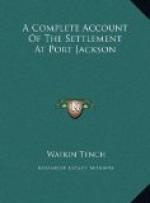Near Mr. Scheffer’s farm is a small patch of land cleared by Lieutenant Townson of the New South Wales corps, about two acres of which are in maize and wheat, both looking very bad.
Proceeded to the farm of Mr. Arndell, one of the assistant surgeons. This gentleman has six acres in cultivation as follows: rather more than four in maize, one in wheat, and the remainder in oats and barley. The wheat looks tolerably good, rather thin but of a good height, and the ears well filled. His farming servant guesses the produce will be twelve bushels,* and I do not think he over-rates it. The maize he guesses at thirty bushels, which from appearances it may yield, but not more. The oats and barley are not contemptible. This ground has been turned up but once The aspect of it is nearly south, on a declivity of the river, or arm of the sea, on which Rose Hill stands. It was cleared of wood about nine months ago, and sown this year for the first time.
[I have received a letter from Port Jackson, dated in April 1792, which states that the crop of wheat turned out fifteen bushels, and the maize rather more than forty bushels.]
December 8th. Went this morning to the farm of Christopher Magee, a convict settler, nearly opposite to that of Mr. Scheffen. The situation of this farm is very eligible, provided the river in floods does not inundate it, which I think doubtful. This man was bred to husbandry, and lived eight years in America; he has no less than eight acres in cultivation, five and a half in maize, one in wheat, and one and a half in tobacco. From the wheat he does not expect more than ten bushels, but he is extravagant enough to rate the produce of maize at 100 bushels (perhaps he may get fifty); on tobacco he means to go largely hereafter. He began to clear this ground in April, but did not settle until last July. I asked by what means he had been able to accomplish so much? He answered, “By industry, and by hiring all the convicts I could get to work in their leisure hours, besides some little assistance which the governor has occasionally thrown in.” His greatest impediment is want of water, being obliged to fetch all he uses more than half a mile. He sunk a well, and found water, but it was brackish and not fit to drink. If this man shall continue in habits of industry and sobriety, I think him sure of succeeding.




